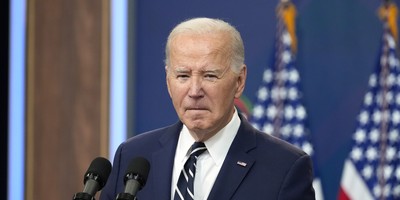There he goes again.
Out on the campaign trail, President Obama is proposing more federal spending as his answer to sluggish growth and jobs. That won’t do it, Mr. President.
He wants more infrastructure spending, undoubtedly in the form of an infrastructure bank. That’s a terrible idea. It’s borrowed from Latin America, where bloated and corrupt bureaucratic construction agencies have helped bankrupt any number of countries in the past.
He wants to lengthen 99-week unemployment insurance, although numerous studies have shown that continuous unemployment benefits are associated with higher unemployment.
And he wants to extend the temporary payroll tax credit, which is not a permanent reduction in marginal tax rates, has no incentive effect, has not worked so far, and is really a form of federal spending -- not real tax relief.
Earlier this week, when he signed the debt-ceiling bill, the president ranted on about the need to raise tax rates on successful earners, investors, and small businesses. He’s trying to bring back tax hikes as part of the phase-two special committee seeking additional deficit reduction, even though his own party rebuffed him on this in the late stages of the debt talks.
All this is a prescription to grow government, not the economy.
What the economy needs, Mr. President, is a strong dose of new incentives, with pro-growth tax reform that flattens marginal rates and broadens the base for individuals and businesses. This includes moving to territorial taxation that ends the double tax on foreign earnings of U.S. companies. Plus, we desperately need a complete moratorium on federal regulations. As Sen. Barrasso recently noted, the government put out 379 new rules on business in July alone, amounting to $9.5 billion in additional costs.
Recommended
None of these pro-growth reforms are in sight. So the stock market is going through a nasty 10 percent correction over fears of another recession (and European debt default).
But at least we got some good news on jobs. The July jobs report came in stronger than expected. It’s not great. But at least nonfarm payrolls increased 117,000 -- as the prior two months were revised upward by 56,000 -- while private payrolls gained 154,000.
That’s definitely not a recession reading. But neither is it a strong performance. If the economy were really rebounding, we would be creating 300,000 new jobs a month.
In the report, the unemployment rate slipped to 9.1 percent from 9.2 percent. But that’s mostly because nearly 200,000 workers left the civilian labor force. Another negative is the household employment survey, which fell 38,000 in July after dropping nearly half a million in June. That survey measures job creation among small owner-operated businesses or the lack thereof.
Yet when looking at the new jobs report, along with reasonable gains in chain-store sales and car sales, plus the ISM Purchasing Managers reports (which stayed above the 50 percent line), I repeat my thought that we are not headed for a double-dip recession.
Over two years of so-called economic recovery, growth has averaged about 2.5 percent. It fell to less than 1 percent in the first half of this year, largely from a commodity-price shock that included oil-, gasoline-, and food-price spikes. That price shock resulted mainly from the Fed’s QE2 depreciation of the dollar -- a big mistake. It eroded real consumer incomes and spending.
Lately, the dollar has stabilized and energy prices have come down quite a bit. That will reduce inflation and support better consumer spending. Businesses are already highly profitable and cash-rich. They are investing some of that, but not nearly enough to create sufficient new jobs. Who would, with all these Washington policies?
Finally, the Fed remains ultra-easy with excess liquidity and a zero interest rate.
So it looks to me like we will return to the sub-par 2.5 percent growth trend rather than dip back into recession. However, at this pace, unemployment may hover around 9 percent right up to election time next year.
More spending won’t do it Mr. President. Tax and regulatory incentives will.
See more top stories from Townhall Finance-
| Mike Shedlock | Fools and the Market Are Soon Parted |
| Larry Kudlow | More Obama Spending Won’t Do It |
| John Ransom | SEIU Shows No Restraint Despite Restraining Order |
| Jeff Carter (NEW) | Market’s Good As Long As Ben Buys It |
| Craig Steiner (NEW) | Obamanomics' Crony Capitalism and Economic Collapse |
| Bill Tatro | Employment Number Goes Down by One |
| Email Ransom | thfinance@mail.com |
| http://www.facebook.com/bamransom | |
| http://twitter.com/#!/bamransom |
























Join the conversation as a VIP Member